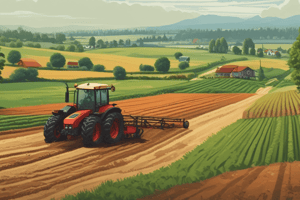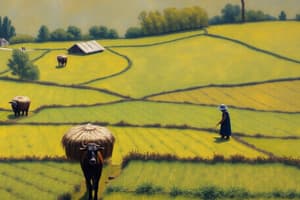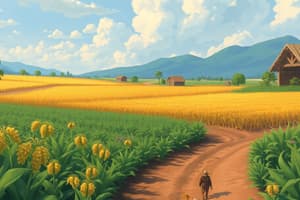Podcast
Questions and Answers
Which crop in India is primarily grown in dry regions and requires sandy or shallow black soils?
Which crop in India is primarily grown in dry regions and requires sandy or shallow black soils?
- Wheat
- Sugarcane
- Rice
- Jowar (correct)
Which of the following is categorized as a Kharif crop?
Which of the following is categorized as a Kharif crop?
- Maize (correct)
- Wheat
- Ragi
- Pulses
What is the annual rainfall requirement for wheat cultivation in India?
What is the annual rainfall requirement for wheat cultivation in India?
- 50 to 75 cm (correct)
- 75 to 100 cm
- Below 50 cm
- 100 cm
In which Indian region is sugarcane primarily cultivated?
In which Indian region is sugarcane primarily cultivated?
What is the primary source of protein in the Indian vegetarian diet?
What is the primary source of protein in the Indian vegetarian diet?
Which of the following crops has a temperature requirement of 21°C to 27°C?
Which of the following crops has a temperature requirement of 21°C to 27°C?
What type of cultivation practices are important for major crop production in India?
What type of cultivation practices are important for major crop production in India?
Which of the following is primarily produced in the north and north-western parts of India?
Which of the following is primarily produced in the north and north-western parts of India?
Which term describes the intensive subsistence farming method?
Which term describes the intensive subsistence farming method?
What is a key characteristic of primitive subsistence farming?
What is a key characteristic of primitive subsistence farming?
Which of the following is NOT a characteristic of commercial farming?
Which of the following is NOT a characteristic of commercial farming?
Which of these crops is typically associated with the Rabi season?
Which of these crops is typically associated with the Rabi season?
What distinguishes plantation farming from other types of commercial farming?
What distinguishes plantation farming from other types of commercial farming?
When does the Zaid cropping season occur?
When does the Zaid cropping season occur?
Which of the following practices is commonly seen in intensive subsistence farming?
Which of the following practices is commonly seen in intensive subsistence farming?
What type of climate is primarily supportive of primitive subsistence farming methods?
What type of climate is primarily supportive of primitive subsistence farming methods?
Flashcards are hidden until you start studying
Study Notes
Farming Types in India
- Cultivation methods depend on environmental characteristics, technology, and socio-cultural practices.
- Farming varies from subsistence to commercial types.
Primitive Subsistence Farming
- Involves 'slash and burn' agriculture; farmers clear land for crops.
- Known as jhumming in northeastern states; low land productivity.
- Relies heavily on monsoon; practiced in limited areas of India.
Intensive Subsistence Farming
- Common in areas with high population pressure on land.
- Labour-intensive with high doses of biochemical inputs for increased production.
Commercial Farming
- Utilizes modern inputs: high-yielding variety (HYV) seeds, chemical fertilizers, insecticides, and pesticides for improved productivity.
- Plantation farming focuses on single crops grown over large areas, often using migrant labor; products serve as raw materials for industries (e.g., tea, coffee, rubber).
Cropping Seasons in India
- Three main cropping seasons: Rabi, Kharif, and Zaid.
- Rabi: Sowing is in winter (October to December), harvesting in summer (April to June); key crops include wheat and barley.
- Kharif: Sowing begins with the rainy season (April-May), harvesting occurs in September-October; important crops include paddy and maize.
- Zaid: Short season between Rabi and Kharif (March to July); crops include watermelon and vegetables.
Major Crops in India
- Diverse crop production driven by soil, climate, and cultivation practices.
- Key crops: rice, wheat, millets, pulses, tea, coffee, sugarcane, oil seeds, cotton, jute.
Rice
- Kharif crop; requires high temperatures, humidity, and over 100 cm of rainfall annually.
- India ranks second in global rice production after China; cultivated in northern plains, coastal, and delta regions.
Wheat
- Rabi crop needing cool growing seasons and bright sunlight; grows with 50 to 75 cm of well-distributed rainfall.
- Main states for wheat cultivation: Ganga-Satluj plains and black soil region of Deccan; second most important cereal crop in India.
Millets
- Includes Jowar, Bajra, and Ragi; classified as coarse grains with high nutritional value.
- Jowar and Bajra primarily produced in dry regions, while Ragi thrives in diverse soil types.
Maize
- Kharif crop optimal in temperatures of 21°C to 27°C, grows on alluvial soil.
- Used as both food and fodder; major production states include Karnataka and Madhya Pradesh.
Pulses
- Largest producer and consumer globally; major protein source in vegetarian diets.
- Grown in rotation to maintain soil fertility; major states include Madhya Pradesh and Rajasthan.
Sugarcane
- Thrives in tropical and subtropical climates; optimum temperature range is 21°C to 27°C.
- Requires manual labor from sowing to harvesting; India ranks second in global sugarcane production after Brazil.
Studying That Suits You
Use AI to generate personalized quizzes and flashcards to suit your learning preferences.




